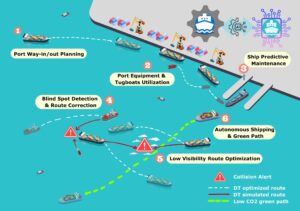Maritime AI
Intelligence for Sustainable and Resilient Ocean Systems

The research group actively advances the integration of Artificial Intelligence (AI) into the maritime sector, addressing complex challenges in navigation safety, offshore renewable energy, maritime decarbonization, and marine environmental protection.
At the core of this effort is the Maritime AI niche, which bridges marine engineering, data science, and sustainability science to enable smart, carbon-efficient, and resilient ocean systems. The group’s work is supported by strong international collaborations, and is reflected through publications in high-impact journals. Its involvement in major international and national research initiatives further underscores its role in contributing to the digital transformation and sustainable innovation of the global maritime domain.

(© Kang, 2025. All rights reserved.)
1. AI–Enabled Maritime Navigation Intelligence
This research utilizes AIS data and deep learning to develop frameworks for vessel maneuvering and marine traffic management in congested waterways such as the Straits of Malacca and Singapore. A key flagship initiative is the Norway–ASEAN Marine Traffic Network (2022–2026), which focuses on risk-aware AIS data sharing to enhance navigational safety and promote digitalized maritime infrastructure across Southeast Asia.
- Liu D., Siow C.L., Kang H.S., Guedes Soares C., 2025, Near miss detection framework based on multi-observational eccentric domain in confined waters, Ocean Engineering, 335 , 121721. doi.org/10.1016/j.oceaneng.2025.121721
- Liu D., Liu Z., Kang H.-S., Siow C.L., Soares C.G., 2024, Traffic complexity assessment on the Malacca Strait with traffic zone matrix based on AIS data, Ocean Engineering, 314, 119687 (IF=5) doi.org/10.1016/j.oceaneng.2024.119687
- Peter Brandt, Ziaul Haque Munim, Meriam Chaal, Hooi-Siang Kang, 2024, Maritime accident risk prediction integrating weather data using machine learning, Transportation Research Part D: Transport and Environment, 104388 (IF=7.3) doi.org/10.1016/j.trd.2024.104388
2. AI for Maritime Decarbonization
This research leverages deep learning to forecast energy demands, optimize vessel emissions, and design low-carbon shipping strategies aligned with EU ETS and IMO decarbonization goals.
- Ten K.H., Kang H.S., Siow C.L., Goh P.S., Lee K.Q., Huspi S.H., Guedes Soares C. 2023, Automatic identification system in accelerating decarbonization of maritime transportation: The state-of-the-art and opportunities, Ocean Engineering 289, 116232. doi.org/10.1016/j.oceaneng.2023.116232
3. AI-Enhanced Offshore Renewable & Marine Structural Systems
Using hybrids and reliability prediction algorithms, this research advances the structural intelligence of offshore wind turbines and shared mooring networks, supporting scalable renewable energy deployment.
- Li C., Tian Z., Shi W., Chuang Z., Yan C., Kang H.S., Guedes Soares C., Li X., 2025, Dynamic analysis of shared mooring based on dual-spar floating offshore wind turbines under combined wave and current action, Ocean Engineering, 341, 122590. (IF=5.5) doi.org/10.1016/j.oceaneng.2025.122590
- Wang L., Xie Q., Wang Z., Guo J., Xu Z., Kang H.S., Li H. 2025, Uncertainty-aware hourly load forecasting of hydrogen-blended natural gas with a hybrid deep learning model, International Journal of Hydrogen Energy, 127 (2025) 541–563 (IF=8.1) doi.org/10.1016/j.ijhydene.2025.04.101
- Wang L., Guo W., Guo J., Zheng S., Wang Z., Kang H.S., Li H., 2025, An Integrated Deep Learning Model for Intelligent Recognition of Long-distance Natural Gas Pipeline Features, Reliability Engineering & System Safety, 255, 110664, (IF=8.1) doi.org/10.1016/j.ress.2024.110664
- Guo J., Wang Z., Li H., Yang Y., Huang C.G., Yazdi M., Kang H.S., 2024, A Hybrid Prognosis Scheme for Rolling Bearings Based on a Novel Health Indicator and Nonlinear Wiener Process, Reliability Engineering & System Safety, 245, 110014, (IF=8.1) doi.org/10.1016/j.ress.2024.110014
4. AI for Marine Environments
This research integrates UAV, AUV, and hydrophone systems with AI analytics for marine debris monitoring and ecosystem protection, contributing to sustainable river–ocean interfaces and biodiversity conservation.
- Rao K., Goh P.S., Xiang G., Xiang X., Tan H., Wong K.Y., Kang H.S., 2025, Robotic sampling of marine microplastics: A comprehensive review, Ocean Engineering, 342, 122691. (IF=5.5) doi.org/10.1016/j.oceaneng.2025.122691
- Goh P.S., Kang H.S., Ismail A.F., Khor W.H., Quen L.K., Higgins D., 2022, Nanomaterials for microplastic remediation from aquatic environment: Why nano matters? Chemosphere 299 (2022) 134418. (IF=8.943) doi.org/10.1016/j.chemosphere.2022.134418
